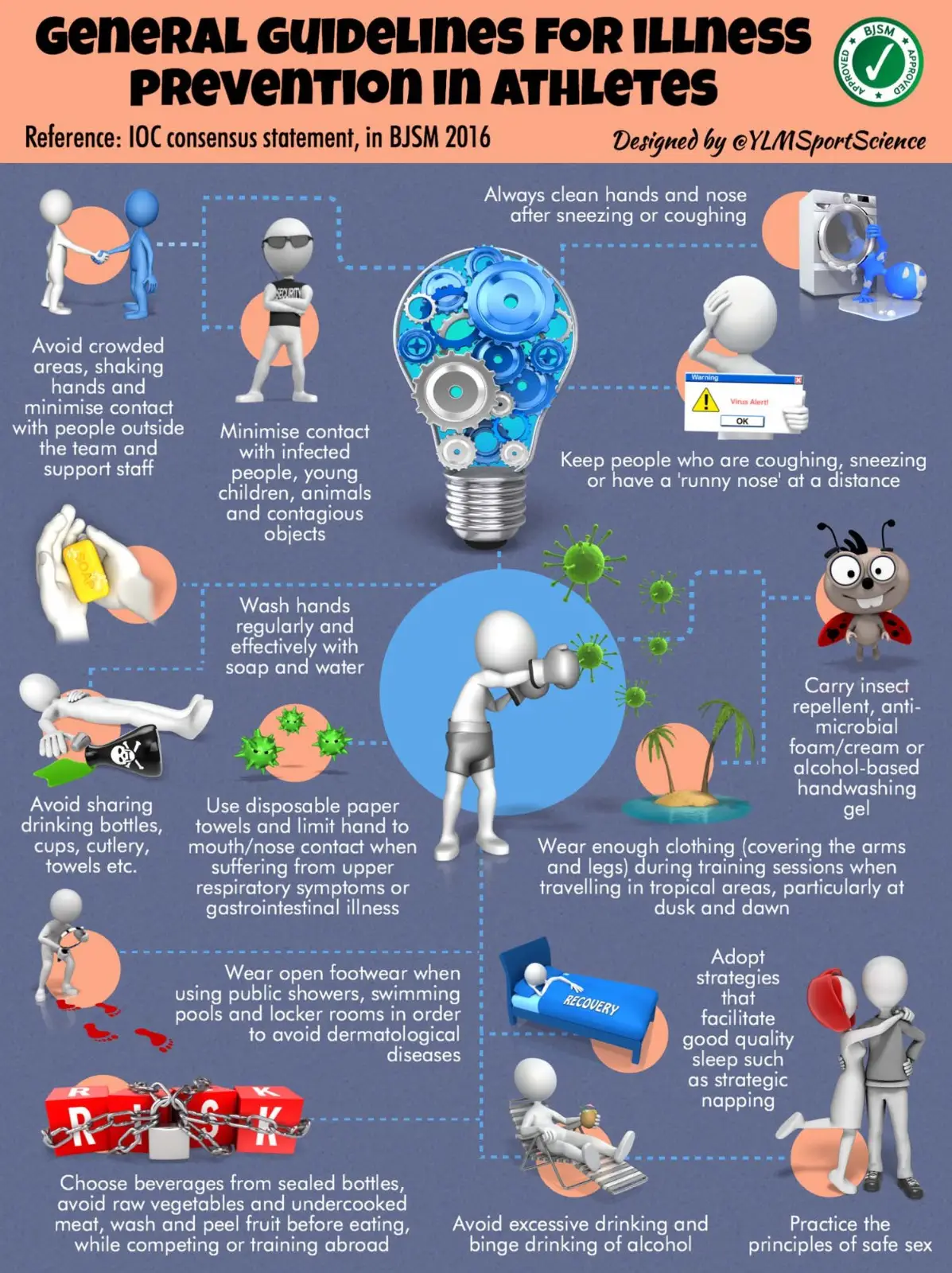In the demanding world of sports, maintaining peak physical condition is essential for athletes. Illness can be a significant setback, affecting performance and recovery. The following general guidelines, based on the IOC consensus statement published in the British Journal of Sports Medicine (BJSM) in 2016, provide General Guidelines for Illness Prevention in Athletes.

Hygiene Practices
Wash Hands Regularly:
Athletes should wash their hands frequently and thoroughly with soap and water. This simple act can significantly reduce the transmission of pathogens.
Clean Hands and Nose After Sneezing or Coughing:
It’s essential to practice good respiratory hygiene to prevent the spread of infections.
Avoiding Contagious Environments
Minimize Contact with Infected Individuals:
Athletes should avoid close contact with people showing symptoms of illness, such as coughing or sneezing, to reduce the risk of infection.
Avoid Crowded Areas:
Steering clear of crowded places can help athletes avoid potential exposure to infectious diseases.
Food and Beverage Safety
Choose Safe Beverages:
Drink only from sealed bottles and avoid consuming raw or undercooked foods. Always wash and peel fruits before eating, especially when traveling abroad.
Avoid Sharing Utensils:
Do not share drinking bottles, cups, cutlery, or towels to prevent the spread of germs.
Personal Protective Measures
Use Insect Repellent:
When training in tropical areas, especially during dusk and dawn, use insect repellent and wear appropriate clothing to avoid insect bites.
Wear Protective Clothing:
Ensure adequate clothing coverage to protect against environmental risks during training sessions.
Environmental Precautions
Wear Open Footwear in Public Areas:
To prevent dermatological diseases, wear open footwear in public showers, swimming pools, and locker rooms.
Use Disposable Paper Towels:
Limit hand-to-mouth and hand-to-nose contact by using disposable paper towels, especially when experiencing respiratory or gastrointestinal symptoms.
Lifestyle and Recovery
Prioritize Good Sleep:
Adopt strategies to facilitate good quality sleep, such as strategic napping, which is crucial for recovery and immune function.
Avoid Excessive Alcohol Consumption:
Refrain from excessive drinking and binge drinking, which can weaken the immune system and impair recovery.
Safe Practices
Practice Safe Sex:
Follow safe sex principles to avoid sexually transmitted infections.
Use Hand Sanitizers:
Carry and also use antimicrobial foam, cream, or alcohol-based handwashing gels, especially when soap and also water are not readily available.







![Evolution Of An Entrepreneur [InfoGraphic]](https://samplevisualization.com/wp-content/uploads/2013/11/Evolution-Of-An-Entrepreneur-InfoGraphic-feature-image-300x225.webp)
![Miracle In Cell No.7 [Infographic]](https://samplevisualization.com/wp-content/uploads/2013/03/Miracle-In-Cell-No.7-Infographic-feature-300x225.webp)
![A History Of Bathing Mobility Hotspots [InfoGraphic]](https://samplevisualization.com/wp-content/uploads/2014/06/A-History-Of-Bathing-Mobility-Hotspots-InfoGraphic-feature-image-300x225.webp)